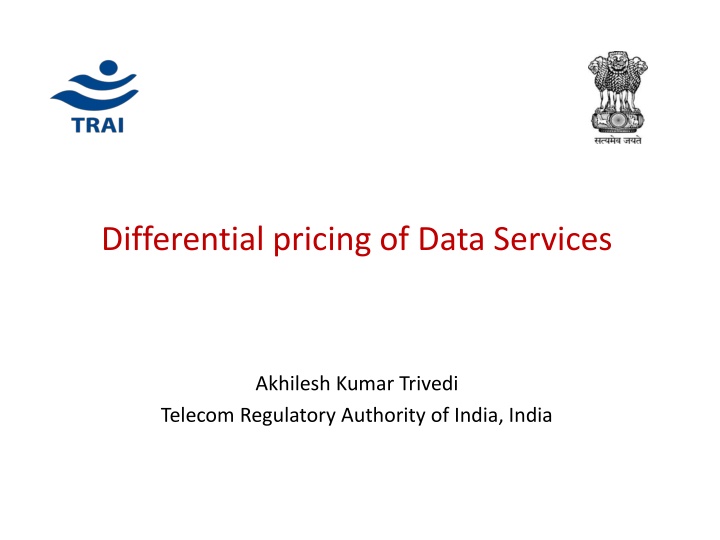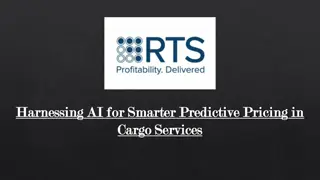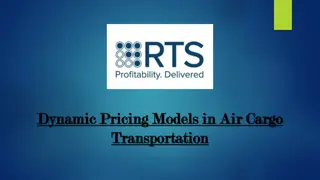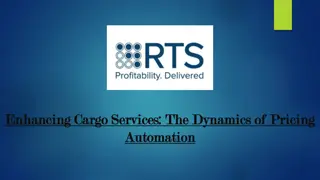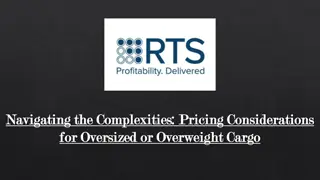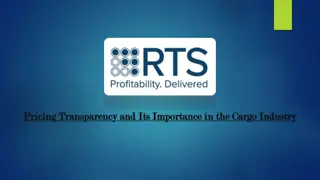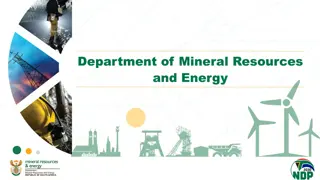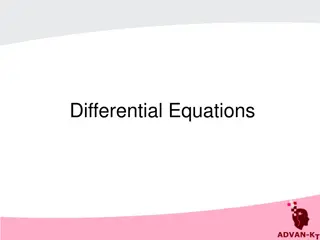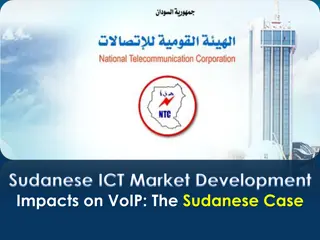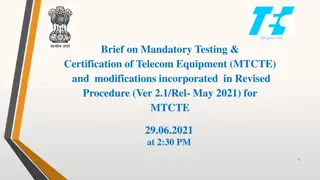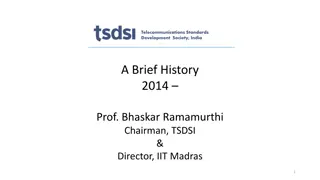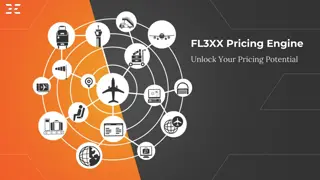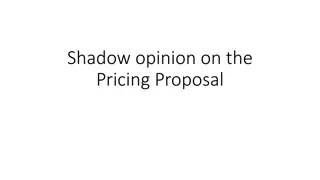Differential Pricing of Data Services in Indian Telecom Sector
Exploring the recent developments in tariff frameworks and regulatory oversight regarding the implementation of differential pricing for data services in the Indian telecommunication industry. The consultation process, regulations, and key statistics reflect the dynamic landscape of the sector.
Download Presentation

Please find below an Image/Link to download the presentation.
The content on the website is provided AS IS for your information and personal use only. It may not be sold, licensed, or shared on other websites without obtaining consent from the author.If you encounter any issues during the download, it is possible that the publisher has removed the file from their server.
You are allowed to download the files provided on this website for personal or commercial use, subject to the condition that they are used lawfully. All files are the property of their respective owners.
The content on the website is provided AS IS for your information and personal use only. It may not be sold, licensed, or shared on other websites without obtaining consent from the author.
E N D
Presentation Transcript
Differential pricing of Data Services Akhilesh Kumar Trivedi Telecom Regulatory Authority of India, India
Index Telecommunication services sector in India at a glance Tariff framework for telecommunication services in India Recent developments on differential tariffs for data services Consultation process Regulations on prohibition of discriminatory tariffs for data services
Telecommunication services sector in India at a glance
Telecommunication Services Sector in India Tele-density of 82 1036 million telephone subscribers 1011 million wireless subscribers 25 million wireline subscribers 325 million Internet subscribers 121 million broadband Internet subscribers
Tariff framework for telecommunication services in India
Tariff framework Tariff under forbearance Only a few services under tariff regulation - national roaming service leased circuits rural wireline service
Tariff framework Regulatory oversight The licensed telecom service providers (TSPs) must report their tariffs to TRAI within seven working days from the date of launch. The tariff must fulfil the broad regulatory principles - Non-discriminatory tariff Transparency in tariff offerings Not anti-competitive Non-predatory Non-ambiguous Not misleading
Recent developments on differential tariffs for data services
Recent developments Several offers with zero or discounted tariffs for accessing certain web-sites/ applications/ platforms were reported to TRAI.
Recent developments Construct # 1: An entity creates a platform wherein content providers and TSPs can register subject to the approval of the platform provider. The customers of the TSPs which are registered on the platform can access those web-sites (either in the full or only certain contents of those web-sites) which are listed on this platform free-of-cost. The remaining content on the Internet is priced as per the tariff plan of the customer. Construct # 2: TSPs offer discounted data tariffs for certain websites/apps through data-packs. The tariff for the remaining content on the Internet is kept higher than this special tariff.
Recent developments Apprehensions against differential tariff offerings: Potential violation of the principle of non-discriminatory tariff differential tariff results in classification of subscribers based on the content they want to access. Those who want to access non-participating content will be charged at a higher rate than those who want to access participating content. Consumers may not experience the full internet . Differential tariffs may disadvantage small content providers who may not be able to participate in such schemes. This may create entry barriers and non-level playing field for these players . It may stifle innovation. TSPs may start promoting their own web-sites/ apps/ services/ platforms by way of discounted or zero tariff.
Consultation process on the issue of differential tariffs for data services
Consultation process TRAI issued a Consultation Paper on Differential Pricing for Data Services on 9thDecember, 2015. Requested stakeholders to provide their written comments on the following issues: Question-1: Should the TSPs be allowed to have differential pricing for data usage for accessing different websites, applications or platforms? Question-2: If differential pricing for data usage is permitted, what measures should be adopted to ensure that the principles of nondiscrimination, transparency, affordable internet access, competition and market entry and innovation are addressed?
Consultation process Question-3: Are there alternative methods/ technologies/ business models, other than differentiated tariff plans, available to achieve the objective of providing free internet access to the consumers? If yes, please suggest/ describe these methods/ technologies/ business models. Also, describe the potential benefits and disadvantages associated with such methods/ technologies/ business models? Question-4: Is there any other issue that should be considered in the present consultation on differential pricing for data services?
Consultation process TRAI received a large number of written responses from stakeholders. The comments and the counter-comments received from the stakeholders were placed on the TRAI's web-site (www.trai.gov.in). TRAI also conducted an Open House Discussion (OHD) wherein a large number of stakeholders expressed their views on the issues raised in the Consultation Paper.
Consultation process Views against differential tariffs for data services Differential pricing for data services is - anti-competitive non-transparent discriminatory against content innovation. The TSPs are custodians of public resource infrastructure that should be made available without discrimination. With differential pricing, the basic principle of internet as a neutral end-to-end carrier of information is violated and make the TSPs as gatekeepers. It is against the freedom of speech/ expression and media pluralism. It restricts consumer choice.
Consultation process Views in support of differential tariffs It helps in product innovation, competition and brings more customers on the internet and thus enhances consumer welfare. No evidence of harm to the stakeholders Helps in garnering investment to build networks View supporting a middle path differential pricing should be allowed on a case-to-case basis. Lower prices for locally-peered content Free web-access, in exchange of advertisements, should be allowed.
Regulations on prohibition of discriminatory tariffs for data services
Regulations Prohibition of Discriminatory Tariffs for Data Services Regulations, 2016 No service provider shall offer or charge discriminatory tariffs for data services on the basis of content. Exemption for certain content A service provider may reduce tariff for accessing or providing emergency services, or at times of grave public emergency: Provided that such tariff shall be reported to the Authority within seven working days from the date of implementation of the reduced tariff and the decision of the Authority as to whether such reduced tariff qualifies under this regulation shall be final and binding.
Regulations Rationale: The subscriber shall have unrestricted access to all the contents available on the Internet except for such content which is restricted by the Licensor/ designated Authority under Law. Restriction can take many forms e.g. price-based differentiation Unified License Agreement - Telecommunication Tariff Order, 1999 The service providers are prohibited from discriminating between subscribers of the same class and any classification of subscribers should not be arbitrary. Tariff differentiation on the basis of content accessed is discriminatory. Right to free speech under Constitution of India includes right to receive information
